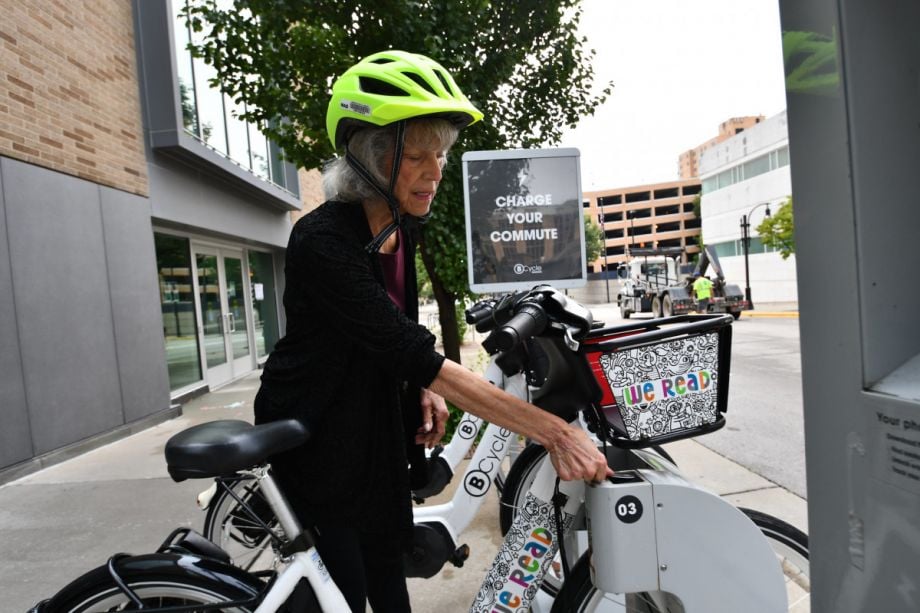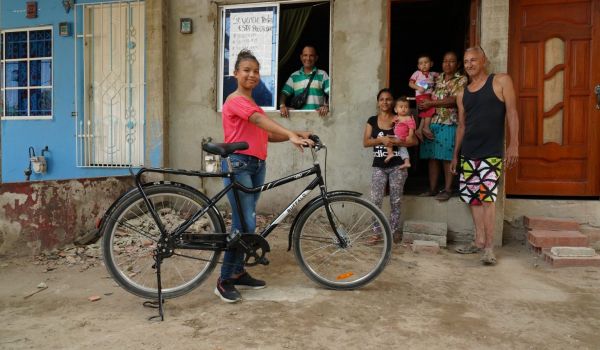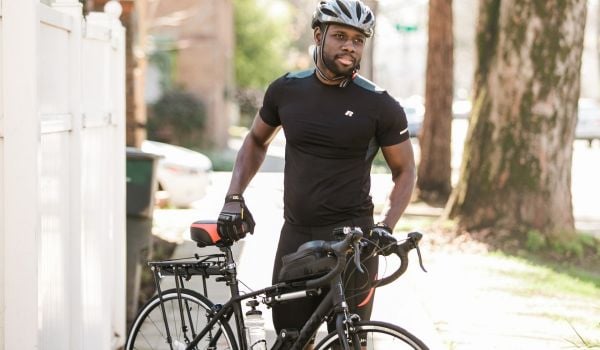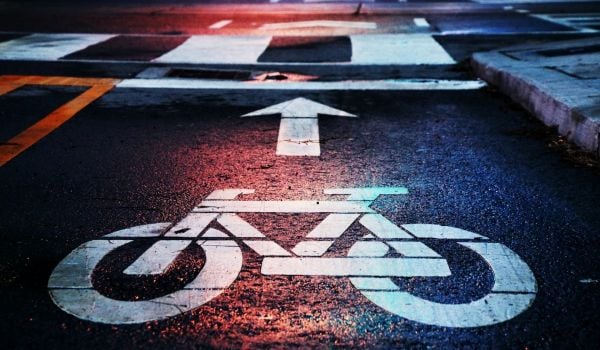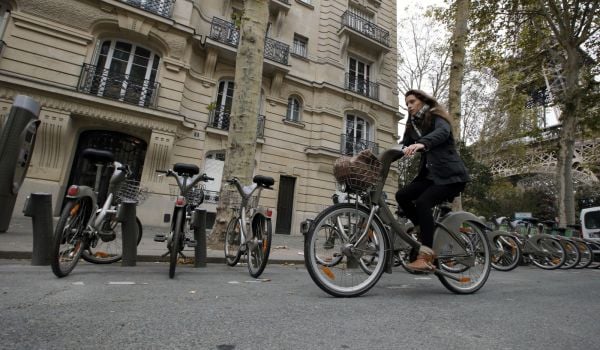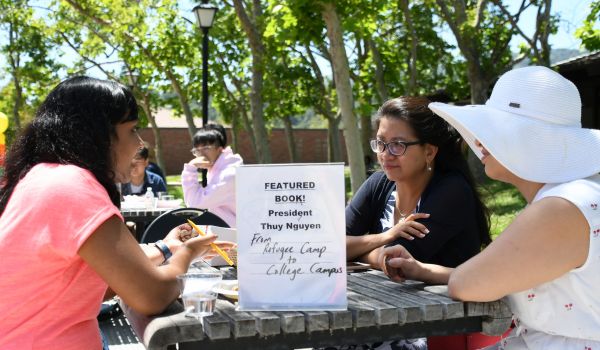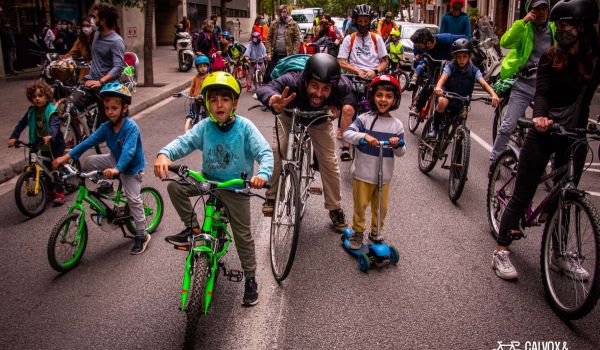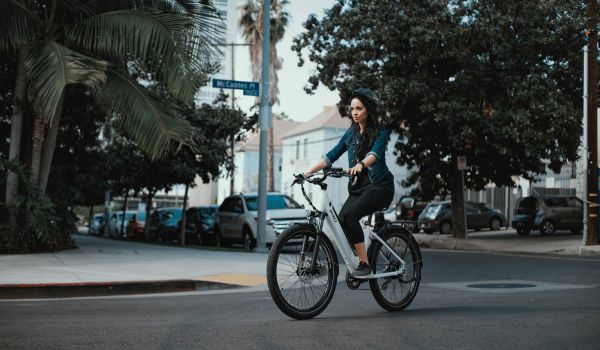At Madison, Wisconsin’s nine public libraries, residents can check out books of all kinds, from hardbacks and paperbacks to ebooks and audiobooks. They can check out movies as DVDs and Blu-rays. And since last year, library card holders can also check out electric bicycles.
Madison’s public libraries are part of a growing number of bike libraries in cities and towns from coast to coast. A list of U.S. bike lending libraries curated by StreetsblogMASS reporter Grecia White documents 35 such programs, from Vermont to Texas. While they all look a little different and work a little differently, they all do the same thing — increase free access to bikes.
As a 2021 report by People for Bikes notes, there are a number of social, cultural and physical barriers that keep cities across the country from creating inclusive biking communities, from unequal distribution of biking infrastructure to prevailing perceptions of cycling as an activity for white men. A study in Portland, Oregon, found that car traffic, know-how, and space needed to maintain and store a bike are among the biggest barriers to bike use.
But cost, the researchers found, gets in the way, too. Even the cheapest road bikes still cost a couple hundred dollars, and the cost can go well into the five-figure range. For those who need an extra boost, most electric bikes cost at least $1,000. Municipal bike shares can help with access issues, but their payment infrastructure doesn’t work for those who are unbanked.
Enter bike libraries. In Madison, as long as you’re one of the 62% of city residents who have a library card, you can check out an electric bike from one of the city’s libraries for free. This is thanks to a partnership with Madison BCycle, an e-bike sharing company in the city whose parent company is Trek, a bike company based in nearby Waterloo, Wisconsin.
Last year Bcycle came to the Madison Public Library Foundation with an idea for a Community Pass Program that would give library card holders access to more than 300 electric bikes across the city.
“Making bike share more accessible in our community is a top priority for us,” Madison Bcycle’s general manager Helen Bradley said in a press release for the program’s launch last September. “Launching the Community Pass Program is one way we can ensure that everyone in our community has access to bike share as a transportation option.”
Instead of requiring the use of a credit card or a smartphone to unlock an electric-assist bike from one of the city’s more than 50 docking stations, Community Pass users check out an access fob from the library instead. The fob passes can be checked out for up to a week at a time. Each of the city’s nine public libraries have two passes available. So far this season, from March 15 until the end of last month, the city’s libraries have seen 279 fob check outs.
“We have nearly two million visits a year in our nine libraries in Madison, so it’s a place where a lot of people are coming and going every day,” explains Tana Elias, Madison Public Library’s digital services and marketing manager. It’s an equity initiative she adds, noting that it gives people the chance to rent a bike if they haven’t ridden one in a while as well as the chance to choose a bike over a taxi or an Uber.
“It’s an opportunity to choose to be a little healthier in your day-to-day activity. But also, if you haven’t ridden a bike recently, it’s a good opportunity to get out there and try it without making a huge commitment.”
Because Madison Bcycle’s infrastructure was already in place, including docking stations outside several library locations, there were only a few puzzle pieces to fit into place. In the end, the waiver that riders sign is from Bcycle so they’re handling the liability. In addition to managing the check-out process, the library foundation purchased helmets to complement the program, so users can check those out too if they like.
Because some of the docking stations are older than others, the technology is different between them and sometimes users had trouble getting the fobs to work right away, but the library has solved that with an information sheet that they co-created with Bicycle that explains how to use the fobs at different docking stations. Plus, “they upgraded some of their stations and they tried a new fob. It was definitely a back and forth testing process with a lot of feedback on both sides,” Elias says.
At the Student Government Association bike library at the University of Massachusetts Amherst campus, the process is a bit more straightforward. The program that’s been running since roughly 2011 checks out cruiser bikes — chosen for their durability, accessibility and comfort — to the school’s students, faculty and staff.
The program has been on pause since the pandemic, but Ibrahim Akar, the SGA’s chief of staff, plans to relaunch the program next month. The key to their re-launch has been building out a waitlist and replenishing the bike supply that went from roughly 45 pre-pandemic to 11 today.
In November, Akar plans to advertise pop-up check out events online and on social media for the bikes that can be checked out for an entire semester and eventually a full year before getting an online reservation system up and running next semester. The bike library is free to use, each bike comes with a lock, and repairs are covered by an on-campus bike co-op that the SGA has partnered with.
“Working in the SGA, we work towards meeting the needs of students on campus and a lot of students would highly prefer to ride a bicycle than wait for the bus,” Akar says. “When you have a bicycle, you can leave on your own schedule and there’s a lot of fun that comes with riding a bike as well. You get to just enjoy the view and breathe in some fresh air. So obviously, if that’s something that the students want, we’re going to work as hard as we can to be able to bring that to them.”

Cinnamon Janzer is a freelance journalist based in Minneapolis. Her work has appeared in National Geographic, U.S. News & World Report, Rewire.news, and more. She holds an MA in Social Design, with a specialization in intervention design, from the Maryland Institute College of Art and a BA in Cultural Anthropology and Fine Art from the University of Minnesota, Twin Cities.
Follow Cinnamon .(JavaScript must be enabled to view this email address)

